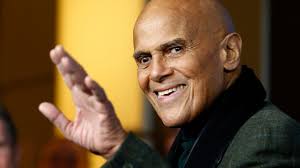APA-Johannesburg (South Africa) In his music and acting career Harry Belafonte who died on Tuesday of heart failure at the ripe old age of 96, was no respecter of racial barriers in the United States or anywhere they presented themselves.
His spokesman Ken Sunshine confirmed the demise of one of the pop industry’s most celebrated and accomplished musicians of all time.
He shone with a rare combination of emmy, grammy, oscar and tony awards, a rarity belonging to the exclusive preserve of music legends who had left their indelible imprints across nations, generations and history.
As a fierce civil rights campaigner, Belafonte’s life transcended his immediate environment and geography to challenge iniquities elsewhere in the world which blighted the lives of the disenfranchised, the disempowered, the poor, the stereotyped and the racially marginalised.
Belafonte once famously said he was first an activist before he considered himself an artist, deliberately letting the latter feed off the former.
In fact in later testimonies about his life, the celebrated award-winning pop star who has a series of firsts under his belt including the first black pop martinee, said his life journey as an activist constantly informed his role as a musician and actor.
A demonstration of this was when he famously turned down a starring role in a film he considered too demeaning to his own race.
On many occasions in performances, Belafonte suddenly transformed the musical stage into a campaign platform against racism, discrimination or institutionalised abuse of minorities.
Being comfortable in his own skin when people of his race were derided and demeaned with reckless abandon, Mr. Belafonte’s confident air was black pride personified, using his talent, charm and charisma to smash racially-motivated barriers which had been the norm for generations.
He not only found common cause with Martin Luther King Jnr in his rallying call for racial equality in the United States in the 1960s but showed a rarely mentioned compassionate side to him when he led King’s family in grief after the civil rights leader was cut down by assassins.
The man born to very modest Caribbean parents would be a familiar figure in rallies around the world against racial inequality, poverty and all forms of discrimination and stereotypes.
It was this fiery activism that took him to Africa’s shores to raise his voice and fists against apartheid South Africa and lend his energy in the cause for the release of Nelson Mandela which would be accomplished in 1990.
A respected ‘Africanist’ torch-bearer for development activism on the continent, Belafonte is also widely hailed in Africa for his philantrophic works around eradicating AIDS but most notably spearheading a relief charity in 1985 to respond to Ethiopia’s worst famine in living memory.
The resultant We are the World hit single generated millions of dollars which was ploughed into international efforts to bail out the famine-afflicted East African country.
His impulse to act was stirred up by news reports about the famine and using his charisma, brought together some of the world’s best known superstars such as Lionel Ritchie, Michael Jackson, Bob Dylan and Diana Ross among others to collaborate and produce the legendary hit song We are the World.
His musical collaborations also included those with South African icon Miriam Makeba, using this stage as a backlash against the apartheid regime in Pretoria and the racial discrimination rearing its ugly head in his own country.
Penning a tribute to Belefonte’s musical legacy, Sierra Leonean writer and journalist Yusuf Bangura wrote: ‘His music was appreciated by all demographic groups when he was at the peak of his career. I must have been six or eight years when ´the banana boat song’ became popular in Sierra Leone. My father had a gramophone and a set of heavy vinyl records, including ´the banana boat song’, which he played every weekend’.
Born in 1927 in Harlem, New York, Belafonte had dropped out of high school, worked at a munitions factory in New Jersey during the Second World War before studying to become an actor.
He is survived by his wife Pamela and six children from three marriages.
WN/as/APA


